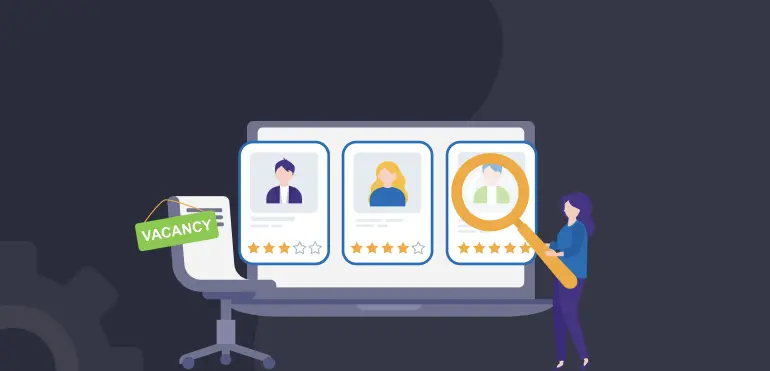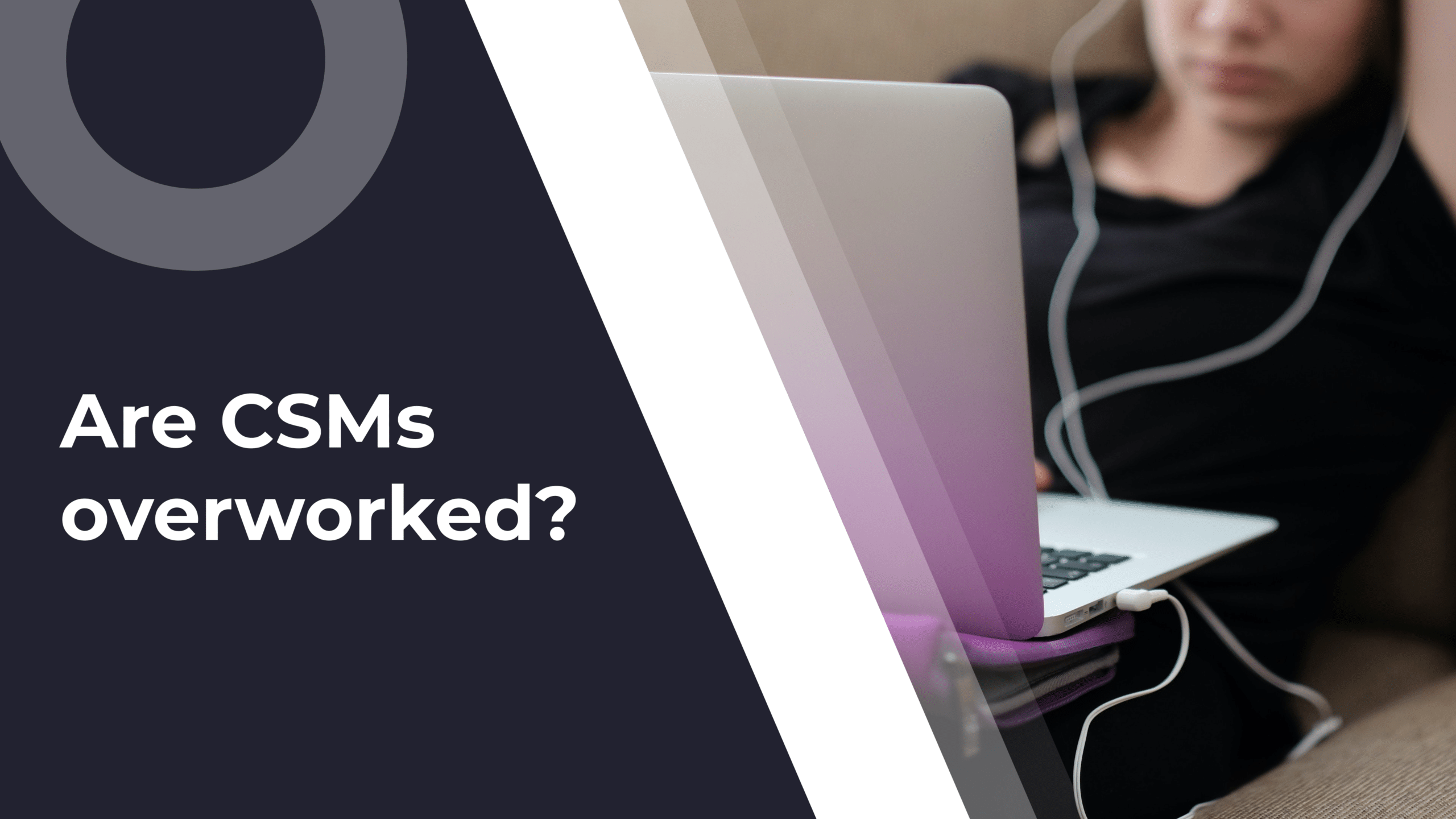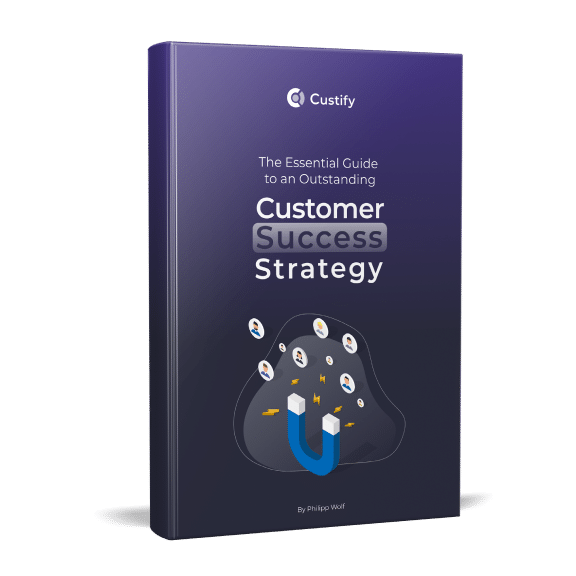Let me ask you something: what’s the one colloquial idiom that also qualifies as a CS best practice?
In my opinion, it’s “Ask and you will receive.”
To be an effective CSM, you need to really understand your customers’ goals, needs, and expectations. And how do you achieve that? You simply ask!
In case you’re not sure what to ask and how — here is a list of the most important questions that CSMs should be asking their customers.
1. “What Information & Resources Can We Provide for You?”
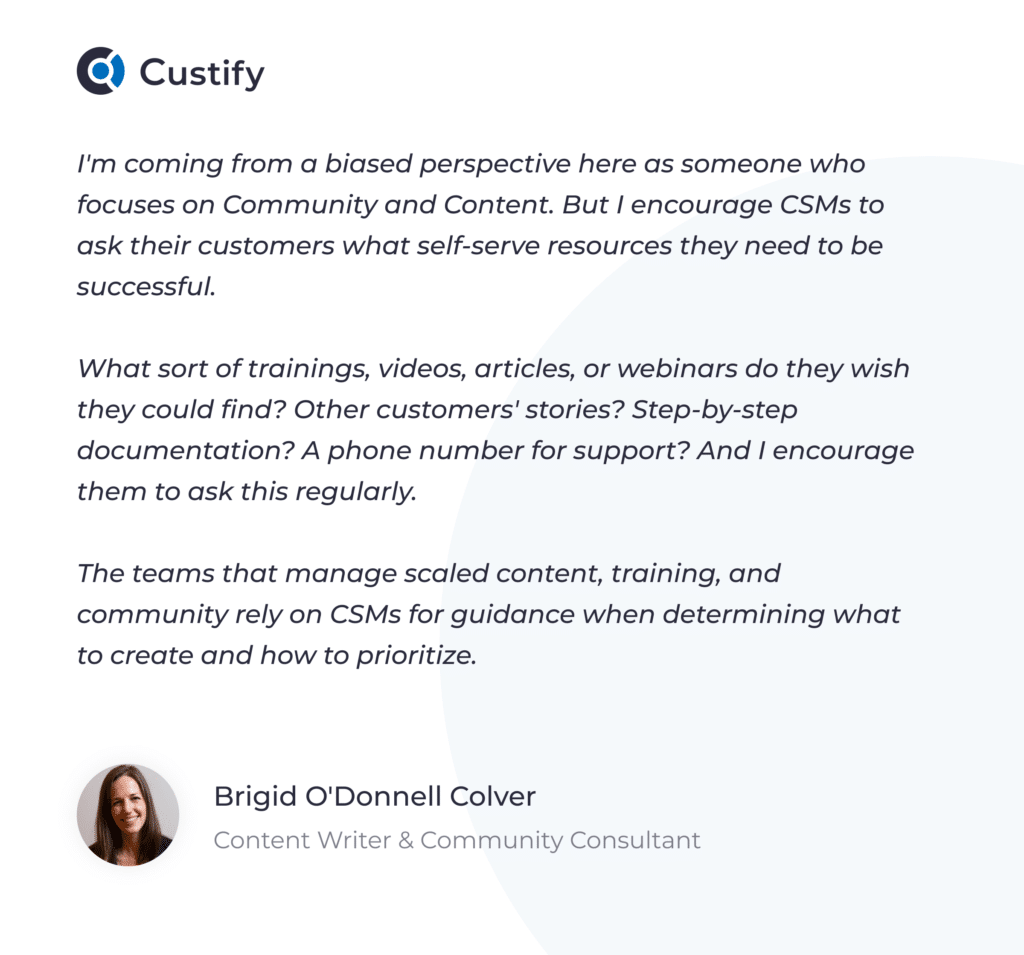
I wouldn’t call Brigid’s perspective biased — self-service is extremely important for the modern customer. In fact, as many as 88% of customers say they expect organizations to offer self-service options.
And as Brigid said, the best way to make sure your self-service portal is valuable and relevant to your customers is to ask them what they’d like you to include there. It’s a simple investment that will give your customers tons of value over the long term
2. “How Does our Solution Align with Your Long-Term Goals and Objectives?”
“CSMs should tailor their questions based on the customer’s stage, taking into account onboarding, regular check-ins, milestone reviews, renewal discussions, and so on.
It’s important for CSMs to not only focus on the benefits and outcomes of their solution, but also to understand the broader context. How is the solution impacting other departments, and how are users/champions reacting?
It may be uncomfortable, but it’s also important to ask about the competition. Let’s face it, the competition is courting your customers, or your customers are checking out the competition.
Inquire about their perceptions of what the competition offers and how you compare. Also, find out if they have considered alternative solutions, including doing nothing or returning to in-house options.
These specific questions come to mind:
- Can you share any recent successes or milestones achieved using our solution?
- How satisfied are your team members with the overall performance of our solution?
- How has our solution impacted other departments within your organization?
- Have there been any notable changes in efficiency or productivity as a result of using our solution?
- What feedback have you received from other users regarding their experience with our solution?
- How does our solution align with your long-term goals and objectives?”
— Delia Ene, Head of Marketing at Sypher Solutions
Delia makes a very important point here. The questions you ask your customers will depend on their respective stages in the customer journey. At the same time, they should also give you more insight into the customers’ strategic plans and outlook beyond your partnership with them.
This way, you will be able to anticipate their evolving needs and pain points and adjust your offering accordingly.
3. “Could You Tell Me More About Your Goals/Pain Points?”
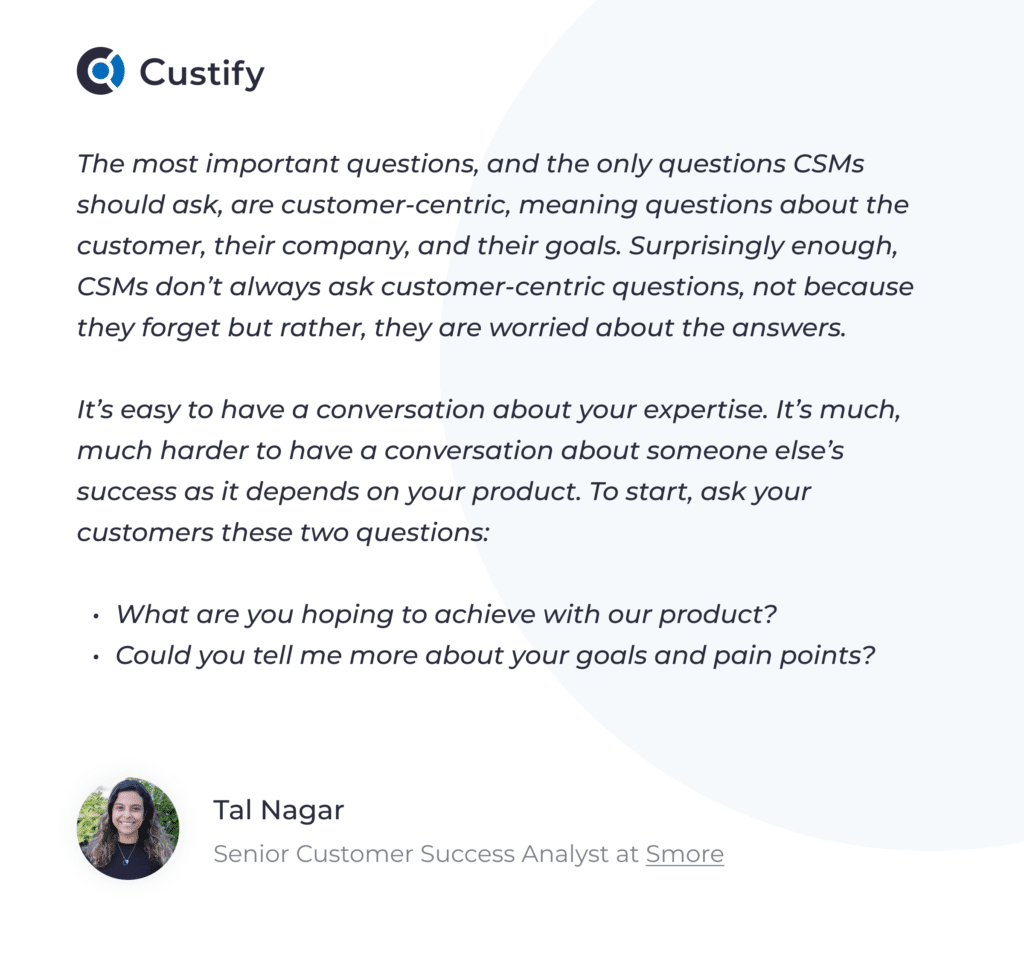
Echoing Delia’s sentiment, Tal also suggests that understanding your customers’ goals and pain points is a must — and she’s right! I also agree that CSMs often fail to adopt a truly objective customer-centric perspective.
Again, this goes back to what Delia said: truly understanding your customers means going beyond the context of your relationship with them.
4. “How Are You Going to Evaluate the ROI of Our Product?”
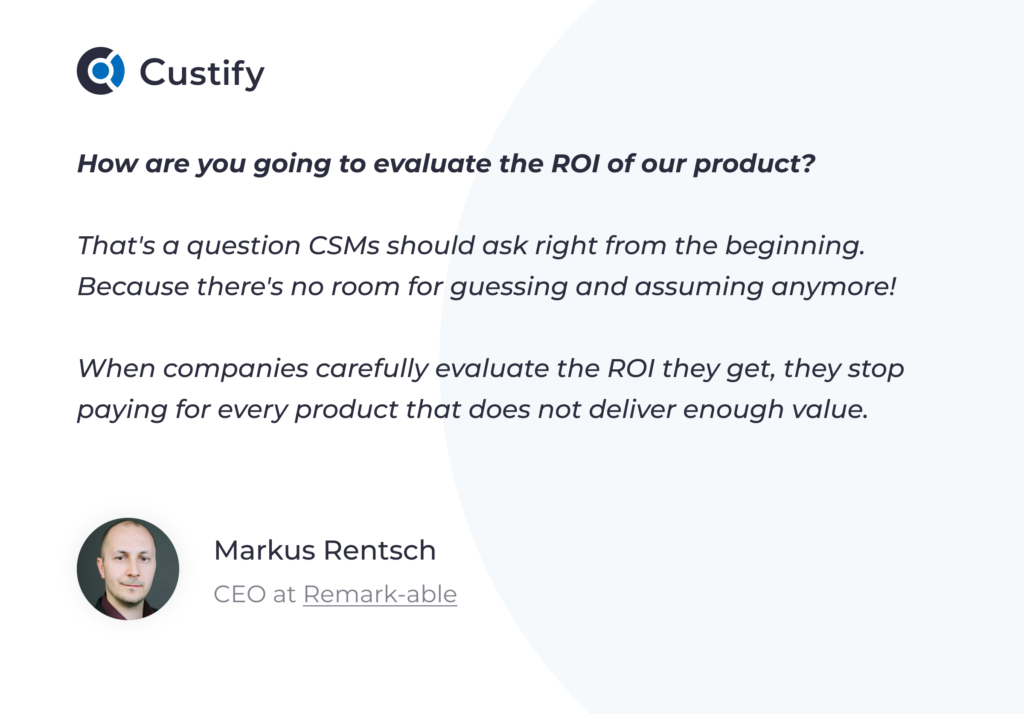
Markus’ suggestion is deceptively simple yet 100% correct. At the end (and at the beginning) of the day, the one outcome that your customers will care about is their ROI for your product.
And if you want your relationships to last, you need to know what that desired ROI is and how they’re going to measure it. This will help you better understand what value your customers are looking to get from your product, and how you can help them get it.
5. “What Does Success Mean to You?”
“To me, the most important questions that a CSM should ask their customer revolve around the customers’ individual goals and needs:
- What are your most specific goals with our product/service?
- How can we align these to metrics, KPIs, and outcomes that your team and company track and report on?
- What does success look like for you individually?
- How will we both know in quantifiable terms when you are reaching your success criteria?
- Have your goals or needs changed since we last checked in?
It’s very important that CSMs make sure their approach is personalized for each customer and check in with them periodically. You want to build long-term relationships — and those require constant work!”
— Jeff Heckler, Director of Customer Success Solutions at MarketSource
Not to sound like a broken record, but personalization is extremely important in CS — down to the questions you ask your customers. That’s precisely where Jeff is coming from. Asking the questions he listed above will help you create a personalized strategy for each individual customer and help them achieve their version of success.
6. “How Satisfied Are You with Our Product”
“Whether you like CSAT or NPS, you seek to know if you’re delighting the customers you serve. I could probably write a whole other essay debating the relative advantages of the two.
Every business, irrespective of how great its good or service, must eventually deal with an outspoken critic who could jeopardize the confidence and standing that it took years to build up.
Finally, some good news! It’s not hard to achieve customer happiness. The first step in making consumers feel heard, understood, and valued is listening to them.”
— Royal Hernandez, Founder/Editor at StarAndLink
Standardized surveys for CSAT and NPS scores can be very helpful. But sometimes, it’s easier and more insightful to ask your customers directly how their feel about your product. Even if the honest response you get is not all that positive, you can use it as an opportunity to refine your offering and overcome criticism.
7. “What Is the One Thing We Could Do to Improve Your Experience?”
“On the surface, I would suggest that this query could be categorized as customer support rather than strategic customer success.
The gold in this query, however, is when your consumers suggest an innovation or new idea for your company to consider.
Often, we do things the same way they’ve always been done simply because that’s the way they’ve always been done. However, consumers have an outsider’s perspective on additional opportunities or potential innovations that would be beneficial to them.
When asking customers this question, encourage them to characterize the ideal experience with your product or service from beginning to end.”
— Robert Smith, Head of Marketing at Psychometric Success
This is precisely what I was talking about in the previous section. Asking your customers to share their honest opinion about their experience is not only about getting testimonials or damage control. It can also give you a fresh perspective on your product and open the door to innovation and improvement.
8. “What Is the Price Point that Makes Sense for You?”
“CSMs often forget to ask customers about their priorities and budgets. With an abundance of options available, customers need to make decisions based on their long-term targets and financial capabilities.
Asking questions such as “What do you see as priority initiatives for your business?” or “What is the price point that makes sense for you?” can help CSMs understand customer needs better and provide more personalized solutions.”
— Geoff Cudd, Founder, Don’t Do It Yourself
Money can be such a taboo topic in CS, and it really shouldn’t be. Remember: each one of your customers has a budget they need to stick to. As a CSM, you should be their partner in navigating their budgetary constraints and getting the most monetary value out of your product.
9. “Are There Any Touchpoints with Our Company that Stand Out as Positive or Negative?”
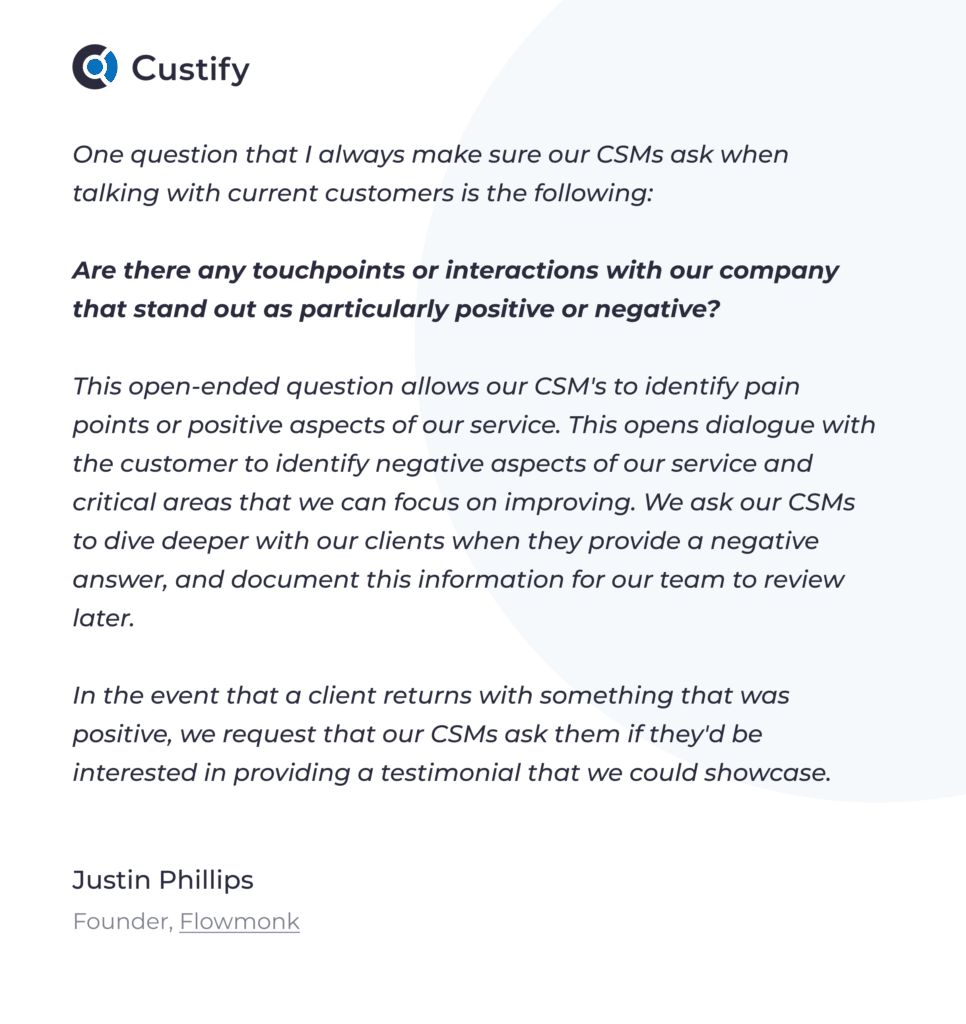
Even the smallest interaction you have with a customer can leave a lasting impression, positive or negative. That impression won’t necessarily be a deal-breaker, but it’s a good idea to keep track of such quirks and refine the manner in which you interact with customers.
10. “How Can We Improve Our Service?”
“Customer success managers play a key role in building healthy and strong relationships with customers. There are some key questions that they should ask their customers, depending on the stage of the customer journey.
For example, during onboarding, it’s very important to understand the real pain that the customer has, what made them buy your product, and how will they measure the implementation’s success. Here are some questions that I advise my team to use:
- What is the preferred communication channel and frequency of communication?
- What are the top 3 pains that you’re trying to solve?
- What are the main goals and objectives for the next period?
- How will we know that we achieved that goal/objective/solved that pain?
During the adoption and maturity phases, CSMs have to make sure that the initial expectations were met.
They also have to understand how things evolved. Expectations are changing, goals are changing, new pains are showing up, product feedback is gathered. The list of questions that I encourage my team to use during business reviews or renewals includes:
- What challenges are you currently facing?
- What are the new goals that you set for the next period?
- Are you getting the desired ROI from our product?
- Are there any internal challenges that can lead to product adoption issues?
- How can we improve our service?
- What would you improve in our product in order to better fulfill your needs?
All these questions will give you a full picture of the customers’ goals, expectations, and challenges, so you will get a better idea of how to support them.
— Irina Vatafu, Head of Customer Success at Custify
If you’re looking for a comprehensive list of questions to ask your customer during onboarding and beyond, look no further. As Irina said, customers’ expectations and goals evolve from one stage of the journey to the next. As such, it’s important that your approach to and interactions with customers evolve accordingly.
Wrapping Up
To get the right insights from your customers, you need to ask them the right questions at the right time. But those questions shouldn’t remain the same from one customer to another.
As our contributors have mentioned several times throughout this article — your customers’ goals, needs, and expectations change as your relationship with them progresses. So, make sure you keep track of these changes and make sure your approach to them remains consistently personalized.

